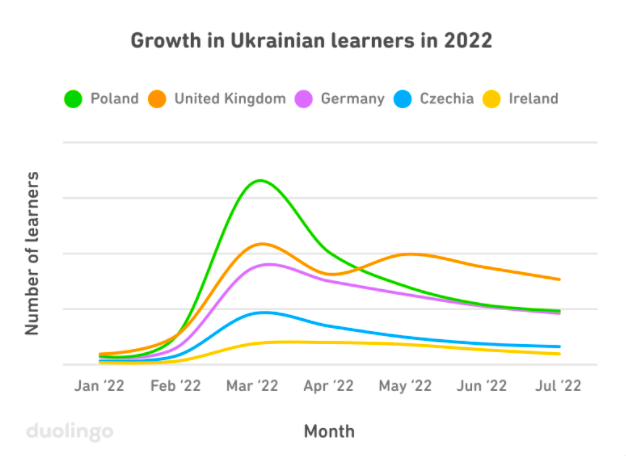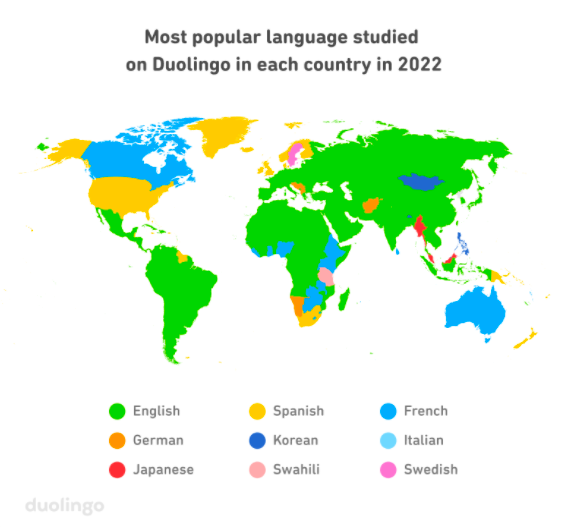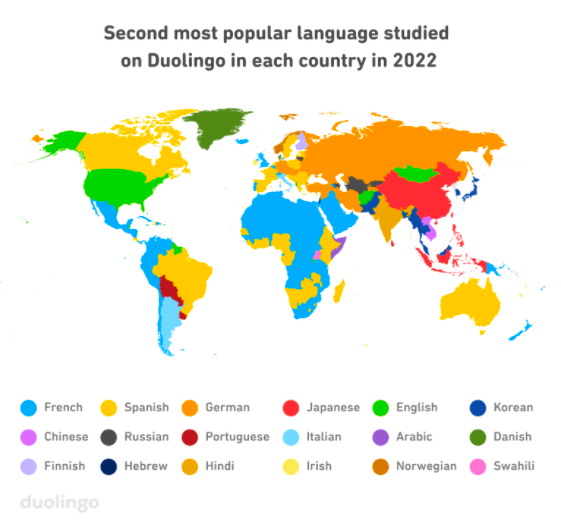Duolingo learners show solidarity with Ukraine in 2022
The results of the 2022 Duolingo Language Report show solidarity with Ukraine through language learning, with a global spike of over 1.3 million people picking up the Ukrainian language.
According to the report, this was the most significant trend of 2022 for the language learning app, as interest in Ukrainian “soared” in the weeks after the Russia’s invasion of Ukraine began, with numbers in peaking in late March 2022 and remaining steady for the rest of the year.
Countries which welcomed the largest numbers of Ukrainian refugees saw significant growth. In the six months following the invasion, the number of Ukrainian learners grew 1651% year-over-year in Germany, 1615% in Poland and 1515% in the Czech Republic. Meanwhile, Ukrainian learners in Ireland grew by 2229%.

Credit: 2022 Duolingo Language Report
In 2022, Ukrainian was the 15th most popular language to study in Germany, compared with 2021 when it was the 36th most popular. Similarly, Ukrainian climbed the rankings for learners in the UK from 37th place in 2021 to 17th in 2022.
In 2022, it was not only in countries geographically near to the war where people chose to start learning Ukrainian. In the US, the language rose from 36th in the 2021 language ranking to 22nd in 2022.
One Duolingo learner, Nicole, works at a Pittsburgh-based organisation that works to improve the lives of refugees and immigrants by matching them with locals to support them in their transition. She shared her reasons for learning Ukrainian through the app.
“The very least that I can possibly do is make an attempt to learn their language as well”
“For me, it’s more of a respect thing for my potential clients. We have families coming here who don’t speak English, and are already going through a very intense transition. And the very least that I can possibly do is make an attempt to learn their language as well” she said.
The report also provided insights into the language learning habits of Ukrainians. German became the second most popular language to study in Germany in 2022 and the report suggests this could be due to the high numbers of Ukrainians who were displaced and subsequently resettled in Germany.
Record numbers of Ukrainians took the Duolingo English Test, with Ukrainian test takers increasing by 4000% year-over-year, as a result of displaced students seeking to continue their education elsewhere.
Other key findings of the report showed that English, Spanish, and French were the most popular languages studied globally, followed by German, Japanese, Italian, Korean, Chinese, Russian and Hindi, completing the top 10.

Credit: 2022 Duolingo Language Report
“Because English, Spanish, and French are so dominant around the world, interesting trends emerge when we consider the second most popular languages studied in each country,” the report said, adding that analysing the second most popular language studied gives us insight into the diversity of languages being learned.

Credit: 2022 Duolingo Language Report
The number of countries where Chinese ranked second place increased in 2022, and there were a number of languages to make the list that were absent in 2021. These include Arabic – now the the second most popular language in Somalia – and Hebrew which is the second most popular in Israel. In addition to this, Swahili appeared as the second most popular language to learn in Uganda.
According to the report, “Although the most popular languages held strong this year, there’s evidence that learner interests are continuing to diversify year after year.”
The report states that the countries with the most serious learners were Japan, Belarus, Hungary, Russia, and Czech Republic as these locations had the highest average time spent learning across all learners.
The post Duolingo learners show solidarity with Ukraine in 2022 appeared first on The PIE News.

